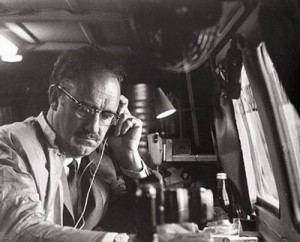Recording phone conversations makes for better copywriting
A few years ago, when I was writing a large number company profiles based on telephone conversations with senior managers, I invested in a professional device for recording them. The device simply monitors both sides of the conversation on my phone and passes the result as an audio signal to my computer. I can record my phone conversations at the drop of a hat and save them as MP3s. (Here’s a link to the THAT-2, which I strongly recommend. It’s not cheap, but the less expensive solutions are not much good in my experience.)

I soon realised that recording calls was a great way to preserve all sorts of conversations, such as those with clients. Our recollections of conversations are often completely wrong, or at least incomplete. If I’m talking through a brief with a client on the phone, making a recording helps to ensure that my first draft will be a lot closer to their expectations.
Often, it’s only on a second listen that I fully understand the points the other person was trying to make. At the time, I realise, I was too busy thinking of what to say in reply. When you have a few years’ experience as a copywriter on the clock, it’s easy to jump to a premature conclusion about what a client wants. Careful, ‘active’ listening is the antidote to this.
Taking notes and maintaining a conversation is difficult, while asking the other person to wait while you scribble is just embarrassing. With a recorder, you can just relax and chat naturally, which puts the other person at their ease.
Also, you record their phrasing with total precision, which does help when capturing their personality in writing. I have got some of the best results – and the most positive client responses – by simply transcribing what the client said. There’s no need to overcomplicate things or add superfluous craft: the client may already have the right words, but lack the confidence to use them.
Often, it’s helpful to repeat important points back to your interlocutor, with your own phrasing. This reassures the other person that you’ve understood what they’re saying. It’s also a great way to capture potentially useful phrases or analogies that occur to you during the conversation. Simply by saying them out loud, you ensure that you’ll have a permanent record of them.
Finally, note that it’s illegal to record telephone conversations without permission in the UK (and possibly elsewhere). I normally start recording, then immediately ask the other person if it’s OK, so that the recording itself includes them giving permission.
Comments (4)
Comments are closed.
Great post, Tom.
Recorded interviews are my secret weapon for feature stories and collateral–there’s nothing better for capturing accurate and colorful quotes. Recorded conversations are also incredibly helpful when you’re drafting healthcare copy, especially to-physician content. They give you a useful record of medical arcana that you can research later, instead of interrupting the conversation.
.-= Lorraine´s last blog ..MarketCopywriter Links From New Delhi =-.
I have been toying with the idea of a LiveScribe pen for a while which records conversations while you write your notes. Later on tapping on your note will replay the voice recording from that moment in time. A couple of times I have ended up with a client saying I agreed to something when I am sure I didn’t. If I had recorded the conversation as well as taking notes I would know for definite what was said.
Tom, I think this is helpful advice. How do you record the telephone conversation? Long ago we used a small round device that suctioned onto the back of the telephone ear piece with a line to a mic plug that fit my “compact cassette” recorder. Ahhh, those were the days.
As I don’t know short hand, I have always recorded my clients. As you say, by using their actual phrases, you can more accurately portray their personalities.